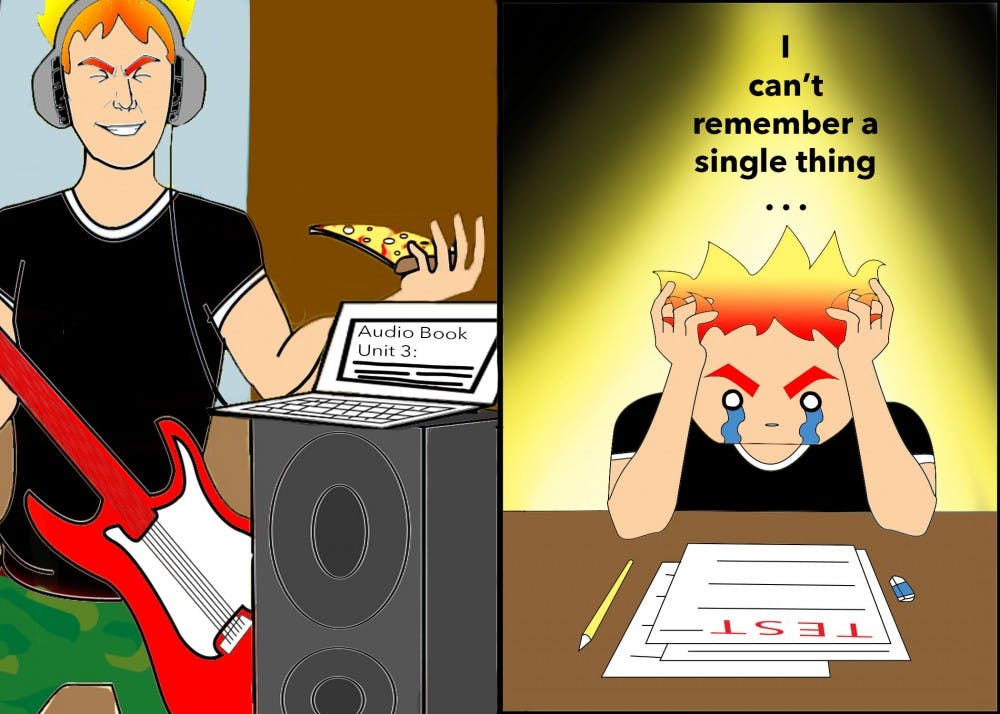The famous phrase "there's an app for that" is no joke. Nowadays, everything is accessible with the touch of a finger, including almost any book you can imagine.
Just when we thought reading couldn’t get any easier, with the help of e-books, we were introduced to audiobooks. We no longer have to read the book to digest its content.
We live in an age that values efficiency above all. We send texts via Siri, while driving, and order dinner with UberEATS, without ever having to pause Netflix.
Audiobooks have been making a huge comeback within the last couple of years, especially amongst college students who have a lot to juggle everyday. While audiobooks save time and effort, they do not allow users to absorb information.
This is an important consideration for students when choosing how to consume their reading materials.
A physical book can benefit a student's cognitive health, prompting them to focus wholeheartedly on the material at hand, whereas, audiobooks lead to a distracted, detached reading experience.
However, audiobooks are becoming more popular.
“A lot of libraries now are getting a lot of audiobooks … a lot more than they used to,” Kathy Troutman, reading specialist at Imagine Schools at Cortez Park, said.
There has been a rise in YouTubers and podcasts that are sponsored by the popular Audible, an app vying to get more people on the audiobook bandwagon.
While audiobooks open the world of reading to a wider demographic, they may not be the best way to actually absorb material for the average reader.
“Maybe they want to hear a book in a foreign language that is (translated) in an English audio – or people who are blind – or people who don’t read well can also enjoy a really good novel,” Troutman said.
Reading is a commitment, unlike an audiobook. You must dedicate your undivided attention and time to the book to fully understand it.
While audiobooks gives the reader an opportunity to multitask as they listen, they may not always benefit in the long run.
“I think that you get more out of a book when you’re reading it … rather than listening to it," Troutman said. "You can understand the story better. Speaking for myself, I can go back and read a part easier than I can go back and look for a part (in an audiobook) if I want to clarify something.”
It is easy to miss important details when you are focusing your attention on multiple things at once, and this is not ideal, especially if the material you are listening to is for a college course.
Listening to audiobooks can also defeat the purpose of visual literary devices and even the writing style of many writers.
Emily Dickinson had a unique writing style where she would capitalize certain words in the middle of her lines and add what seemed like unnecessary hyphens throughout her poems.
Unless a reader were to physically see the text, they would never catch these peculiar literary devices.
Physical copies of books also aid in the advancement of vocabulary.
“I still feel ... that it’s good for their vocabulary. Anybody can improve their vocabulary, and I think reading is a good way (to do that),” Troutman said. “It’s good brain exercise. You need to exercise the brain, and if you’re just listening, you’re not really giving that brain the activity it needs.”
This is something that would benefit many of us, especially in a society where we abbreviate everything through text.
Although there are many pros and cons to both physical copies of books and audiobooks, the latter could never replace the former.
At the end of the day, you take away much more from a physical book. Not to mention, being surrounded by thousands of books and calm readers at Barnes & Noble is a great way to relax.
Traditional reading boasts significant cognitive benefits that audiobooks simply cannot offer. This is especially important to students looking to effectively absorb the materials they are reading.
Reach the columnist at trwska96@gmail.com or follow on Twitter @trwscuit.
Like The State Press on Facebook and follow @statepress on Twitter.
Editor’s note: The opinions presented in this column are the author’s and do not imply any endorsement from The State Press or its editors.
Want to join the conversation? Send an email to opiniondesk.statepress@gmail.com. Keep letters under 500 words and be sure to include your university affiliation. Anonymity will not be granted.




